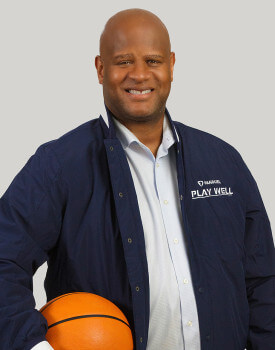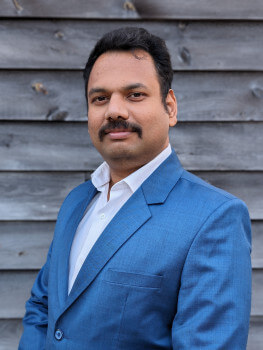



Artificial intelligence has changed our daily lives and we have only just scratched the surface. The magnitude of the shifts we're experiencing feels unprecedented, but it is actually quite natural. Changes of this scale happen all the time, with complex ecosystems emerging and flourishing following radical ecological resets. The evolution of humanity and nature is deeply intertwined, often reshaping the world in subtle yet profound ways. And while it's true significant transformations can be monumental for some animals (RIP Brontosaurus), they can allow others to thrive (Bonjour mammals!).
In this opening keynote, evolutionary biologist and CTV Science Expert Dan Riskin will relate three principles he sees in the animal groups most resilient to change: passionate curiosity, open-mindedness, and diversity. It's a smart, funny, and engaging talk that will leave you seeing this moment in time differently—feeling empowered to lean into these changes and take full advantage of what A.I. has to offer.

Across the globe, operators are using A.I. to monitor player behaviour, detect markers of harm, and identify opportunities for intervention — from push notifications and personalized emails to direct outreach by customer care teams.
In this session, we’ll explore key questions that guide strategic decisions: When is the right moment to intervene? What’s the impact of human vs. automated intervention, how do players respond, and what risks should we consider? How can we measure the effectiveness of these interventions and what defines a “successful” intervention?




Women’s engagement with gambling is evolving and expanding across platforms, from traditional casino games to online gambling, and sports betting. As participation for this demographic grows, it’s crucial to explore the unique motivations and challenges women face.
This session will examine how women experience gambling, taking a closer look at distinct risk factors, including financial harm, mental health impact and the added weight of societal stigmas. The panel will discuss approaches for designing inclusive and informed awareness programs and campaigns that address the specific needs of women—helping build safer, more responsive gambling environments and healthier communities.





Apps have become integral to our daily lives, embedded in everything we do — from banking and coffee purchases to meditation and socializing. They offer direct access to digital spaces, providing fast, and often personalized ways to connect, track, and secure unique benefits while influencing behaviours. Numerous gaming apps now support players by monitoring gambling activity, enabling self-exclusion, and offering access to treatment-like services.
In this session, we will explore the research on the effectiveness of current digital health apps. We will also hear how lived experiences have shaped some of the leading apps, highlighting a range of tools and supports that go beyond tracking play to address the factors influencing behaviour. Finally, we will discuss how these tools can be more effectively integrated into industry support systems.





How can we harness participation, leadership, and expertise to drive change through the involvement of community members with lived experience, community organizations and system partners in ways that create space for innovation; and encourage the development of shared visions and goals for greater collective impact in advancing RG measurement?
During this session, we will hear from the members of the Ottawa Gambling Harms Prevention Network who will share the catalyst and development process that led to the creation of this network, and learn how each member contributes to the vision and mission of this collaborative group driving change in Ottawa.
Learning Objectives:
1. Learn how to develop and maintain effective partnerships with multi-sectoral partners
2. Learn how to leverage partner assets and capacity
3. The importance of a system "anchor" agency, and how to manage the complexities within this role







The rapid growth — and growing normalization — of sports betting has reshaped the digital landscape for many young people. As a group uniquely primed for heightened risk, they’ve become a critical focus for prevention and education efforts. We must collectively consider: What challenges do we need to address in this evolving environment? And what risks are emerging for young people — particularly for a very high-risk segment, student athletes?
This session will explore collaborative strategies to reduce gambling risks and harms among young people. Panelists will share powerful stories of lived experience and resilience — and how they’re using their voices to educate students, teachers, parents, and coaches across North America.



Safer gambling tools are more accessible than ever, yet player uptake remains limited. In response, some jurisdictions have adopted a more proactive approach to increasing engagement and adoption.
This session will highlight real-world case studies and key learnings from jurisdictions leading the way in encouraging the use of responsible gambling tools. Experts will share forward-thinking approaches, explore what’s worked so far, and discuss how industry stakeholders can continue collaborating to promote positive, sustainable play.




First Nations communities provide programs and services responsive to the needs of the populations they serve grounded in culturally appropriate, historical and traditional beliefs and methods.
During this session, participants will hear from a panel of Indigenous community organizations who will share context and insights about the unique challenges experienced in First Nations communities; strategies in health promotion and RG related programming; and key considerations for exploring partnership with Indigenous community organizations.
Learning Objectives:
1. Learn the importance of understanding the Indigenous community
2. How Indigenous-focused programs and service differ from mainstream program and services provision
3. How to respectfully engage with Indigenous and/other ethnocultural communities



As the gaming industries continue to evolve, the role of responsible gambling initiatives — particularly self-exclusion programs — has become increasingly critical. This session will explore how advancements in self-exclusion programs can help normalize access, reduce stigma, and enhance overall player support. We’ll examine how to strike a balance between regulatory compliance and a human-centred approach, highlighting the benefits of ongoing collaboration — both during and after registration — for better outcomes.




This session will explore marketing intricacies within the advertising sector, examining how leading industries—including platforms, standards and tech—are working to protect high-risk populations. We will discuss the strategies and core principles to guide communications that effectively promote healthier gambling behaviour.
Additionally, we’ll examine the growing importance of digital wellness intervention within platforms to prioritize safeguards and protect vulnerable users. We’ll hear directly from a self-regulatory organization about public concerns and preclearance measures for broadcast as well as actions being taken to ensure high-risk groups such as minors are protected from harmful content and exposure from the technology sector.




Advancements in player tracking has increased the volume of available player data across both online and land-based environments. Access to this level of information provides a critical opening to leverage data for a holistic view of player behaviour, with the opportunity to better identify and support at-risk individuals, especially if information were shared across multiple platforms. We will explore if operators and regulators can leverage shared databases to strengthen player protection and if access to more player information sets a higher standard of accountability for operators and regulators? Where do we draw the line between industry’s responsibility and the player’s autonomy?
Join this global panel, bringing together diverse perspectives and deep expertise, as we discuss this timely and highly debated topic, and explore how safeguards are evolving across continents.







